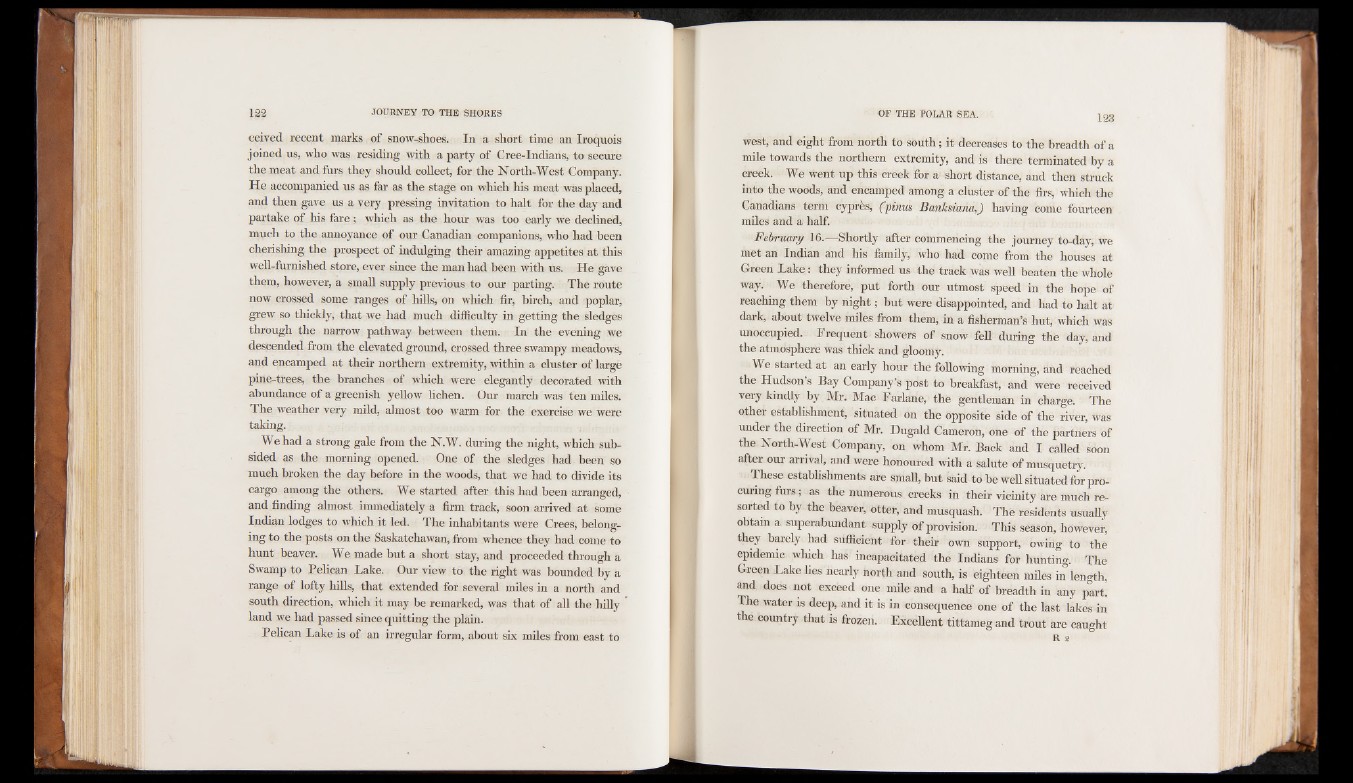
ceived recent marks of snow-shoes. In a short time an Iroquois
joined us, who was residing with a party of Cree-Indians, to secure
the meat and furs they should collect, for the North-West Company.
He accompanied us as far as the stage on which his meat was placed,
and then gave us a very pressing invitation to halt for the day and
partake of his fare ; which as the hour was too early we declined,
much to the annoyance of our Canadian companions, who had been
cherishing the prospect of indulging their amazing appetites at this
well-furnished store, ever since the man had been with us. He gave
them, however, a small supply previous to our parting. The route
now crossed some ranges of hills, on which fir, birch, and poplar,
grew so thickly, that we had much difficulty in getting the sledges
through the narrow pathway between them. In the evening we
descended from the elevated ground, crossed three swampy meadows,
and encamped at their northern extremity, within a cluster of large
pine-trees, the branches of which were elegantly decorated with
abundance of a greenish yellow lichen. Our march was ten miles.
The weather very mild, almost too warm for the exercise we were
taking.
We had a strong gale from the N.W. during the night, which subsided
as the morning opened. One of the sledges had been so
much broken the day before in the woods, that we had to divide its
cargo among the others. We started after this had been arranged,
and finding almost immediately a firm track, soon arrived at some
Indian lodges to which it led. The inhabitants were Crees, belonging
to the posts on the Saskatchawan, from whence they had come to
hunt beaver. We made but a short stay, and proceeded through a
Swamp to Pelican Lake. Our view to the right was bounded by a
range of lofty hills, that extended for several miles in a north and
south direction, which it may be remarked, was that of all the hilly
land we had passed since quitting the plain.
Pelican Lake is of an irregular form, about six miles from east to
west, and eight from north to south ; it decreases to the breadth of a
mile towards the northern extremity, and is there terminated by a
creek. We went up this creek for a short distance, and then struck
into the woods, and encamped among a cluster of the firs, which the
Canadians term cyprès, (pinrn Banksiana,) having come fourteen
miles and a half.
February 16..—Shortly after commencing the journey to-day, we
met an Indian and his family, who had come from the houses at
Green Lake : they informed us the track was well beaten the whole
way. We therefore, put forth our utmost speed in the hope of
reaching them by night ; but were disappointed, and had to halt at
dark, about twelve miles from them, in a fisherman’s hut, which was
unoccupied. Prequent showers of snow fell during the day, and
the atmosphere was thick and gloomy.
We started at an early hour the following morning, and reached
the Hudson’s Bay Company’s post to breakfast, and were received
very kindly by Mr. Mac Farlane, the gentleman in charge. The
other establishment, situated on the opposite side of the river, was
under the direction of Mr. Dugald Cameron, one of the piartners of
the North-West Company, on whom Mr. Back and I called soon
after our arrival, and were honoured with a salute of musquetry.
J r^'^lese establishments are small, but said to be well situated for procuring
furs ; as the numerous creeks in their vicinity are much resorted
to by the beaver, otter, and musquash. Thë residents usually
obtain a superabundant supply of provision. This season, however,
they barely had sufficient for their own Support, owing to the
epidemic which has incapacitated the Indians for hunting. The
Green Lake lies nearly north and south, is eighteen miles in length,
and does not exceed one mile and a half of breadth in any part.
The water is deep, and it is in consequence one of the last lakes in
t e country that is frozen. Excellent tittameg and trout àre caught
R 2